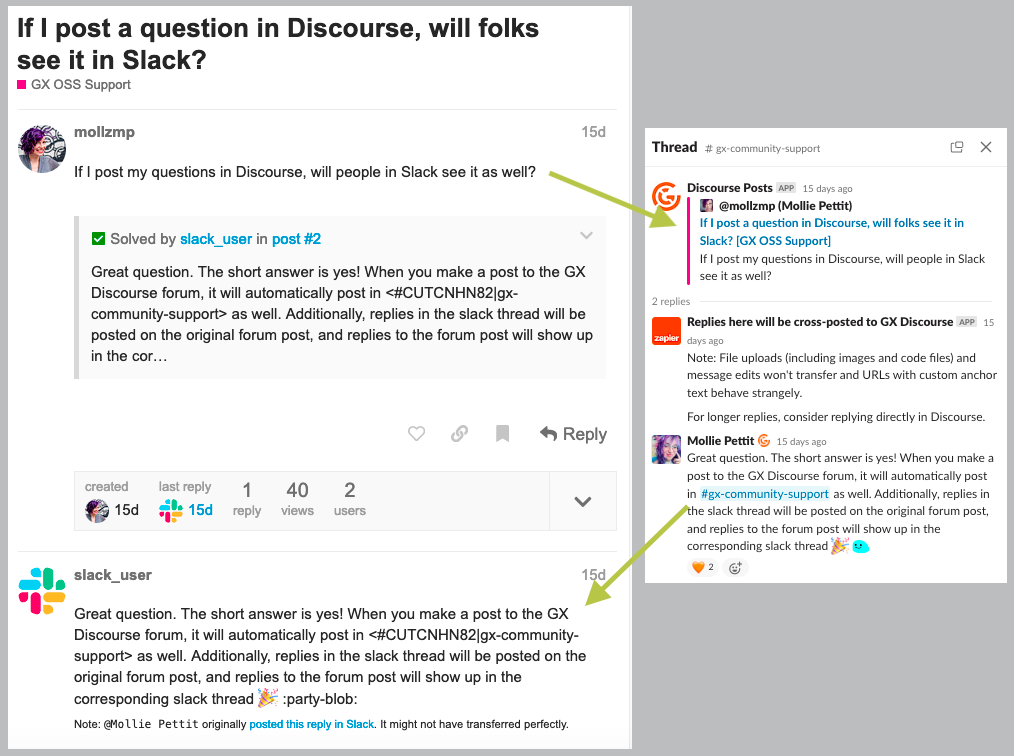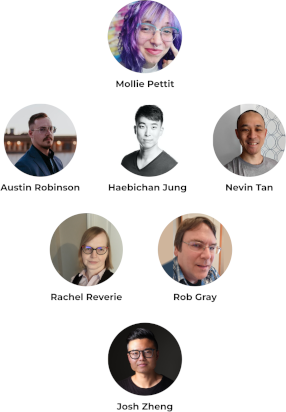
Engaging with the GX community is one of the most valuable resources a GX user has. Our community is the vehicle for:
GX users providing support to one another
Connecting with the developer relations (devrel) team for insights & information
Sharing information about GX and about data quality as a whole with other community members
But there are a lot of options for exactly where you can engage in the community, and we don’t want anyone to be intimidated when posting for the first time. So in this post, I’ll walk you through the different channels available, explain what each is for, and introduce you to the main GX people you’ll see there.
Places: Slack and Discourse
GX has two main community spaces: Slack and Discourse. Discourse is the venue for support and support-adjacent questions, whereas Slack is a primarily social setting. Together, they create a more robust and usable resource for the community than Slack could alone.
Why have two spaces?
Up until a couple of weeks ago, the GX community had one space: our Slack. Slack is good at a lot of things, but ‘being a knowledge base’ is not one of them.
The main problem: Slack isn’t publicly searchable and can’t be crawled by search engines. That puts up a significant barrier to finding and sharing conversations that take place in it. The contents of Discourse, on the other hand, are searchable.
Senior community product manager Mollie Pettit talked about this change at our July 2023 meetup:
Discourse: the home of GX technical support
The GX Discourse forum is a supportive place for getting your questions answered. We want to move toward a future where the majority of focused Q&A about GX takes place in Discourse, where the information is easier to find and sticks around long-term.
Not only will users be able to reference past questions better in Discourse, but the potential group of people who might ask and answer questions will be much larger, since the Discourse is findable through search engines. More participants means more and better support.
During the transition from Slack-based support to Discourse-based, we recognize that some users might not be ready or able to migrate from Slack. To ensure that Discourse questions get visibility in Slack (and vice versa), Discourse and Slack are currently mirrored.
This means:
A new post in the OSS Support category of Discourse automatically creates a Slack thread in #gx-community-support.
A reply to that post in the Discourse topic or the Slack thread is automatically cross-posted to the other space.
Here’s an example of a question that was originally posted in Discourse and then replied to in Slack:

How does GX Open Source support work?
GX OSS is a free product, so the primary source of support is the community! The GX developer relations team is also active in the community and contributes when possible.
If you have a support question for GX OSS, take these steps:
If you haven’t checked the documentation and existing support channels for answers, do that first.
Read the How to get your questions answered post and make sure you have all the relevant information about your question.
Open up the GX OSS Support topic in Discourse, or the Slack #gx-community-support channel.
Post your question!
Keep an eye on your post in case community members or devrel have followup or clarification questions.
How does GX Cloud support work?
Since the GX Cloud Beta is a closed program, the support process is a little different than that for OSS.
It takes place mainly in a private Slack channel, #gx-cloud-beta-support; DM @Matthew Lundgren (GX) in Slack if you need help getting into this channel. This channel’s integration with Discourse is one-way: top-level Discourse posts are mirrored to Slack, but not vice versa.
Once you’ve joined the Beta support channel, take these steps to get support:
If you haven’t checked the documentation and existing support channels for answers, do that first.
Read the How to get your questions answered post and make sure you have all the relevant information about your question.
Open up the #gx-cloud-beta-support channel if you’d like to keep your post and replies private to Beta program participants, or the GX Cloud (Beta) Support Discourse if you’re OK with your post and its replies being public.
Post your question!
Keep an eye on your post in case other Beta users or devrel have followup or clarification questions.
Slack: the place for conversation
Slack is where GX community members can engage with each other in a more social setting. Here are some of the major channels you can post in:
#data-quality-discussion: If you want advice about using GX or about data quality in general, this is the place to post! Past questions have included things like:
Have you found the DAMA CDMP certification to be valuable for your career?
Databricks users, I’m torn between the native DLT expectations and GX—what should I consider before I decide?
Has anyone built data quality scorecards using GX?
#events: Promote your event, find events you want to attend, and connect with other GXers at an event here! You can also post recordings of past events. Events do not have to be data-quality-specific, but should be relevant to the greater data space or of interest to a data engineering audience. Examples of events that have been promoted in this channel are:
#gx-feedback: Let us know what you think about everything GX! We want to know what you love, what you hate, and what you want to see next. And we really mean everything GX: we welcome feedback not just on the product, but on our documentation, community meetups, or any other way you interact with the GX product or company. Recent items we’ve gotten feedback on are:
Suggested features and diagrams for our documentation
Blog posts
Data Assistant behavior and functionality
Experience with the quickstart
#gx-share: Have you written an article, discovered a cool technique, or made a video about something GX? Put it here! Interesting and helpful content is more important than polish, so don’t worry if writing or video production aren’t your forte. Past items shared here include:
A 3-minute demo of building a Batch request for data using the Spark DBFS Datasource
How to read and validate a Google Sheet using `PandasDatasource` and `CSVAsset`
There are also a couple of announcement channels you might find useful:
#gx-releases: Our release changelogs are posted here! We strive to cut a new release every Thursday, and this channel is where you can find out the minute it happens.
#announcements: Just like it says on the box, this is where we post updates and news that aren’t releases.
Feel free to explore the rest of the channels in the Slack, too! Here are some of the more popular special interest channels:
#contributing: For questions about contributing to GX OSS.
#job-board: For job postings relevant to members of the GX community. Reasonable self-promotion for job seekers is also allowed!
The GX people you’ll meet
The GX community is growing rapidly, with 10.6k+ users in Slack alone as of this writing. On the GX side, though, there’s a small group of people that you’ll be seeing around most often: our developer relations team.
Mollie Pettit is the senior community product manager. Growing and supporting the GX community is her #1 priority, so don’t hesitate to reach out to her! She’s @Mollie Pettit in Slack and @mollzmp in Discourse.
Our developer advocates are Austin Robinson, Haebichan Jung, and Nevin Tan.
You also might run into our technical writers, Rachel Reverie and Rob Gray.
Finally, our head of developer relations is Josh Zheng.

Code of conduct
Our goal with GX community spaces is to create a vibrant and productive place for members to share knowledge, ask questions, provide feedback, and showcase their successes.
To do that, some key points of our code of conduct are to:
Be kind and respectful of fellow community members
Be inclusive and accepting—hostile or offensive conduct will not be tolerated
Welcome beginners
Avoid posting the same post in multiple places
Promote your products only in the designated spaces (#tools-and-services in Slack)
Refrain from soliciting (cold DMing) community members about your product
You can read the complete code of conduct here.
And that’s a wrap on our tour of the GX community—we look forward to seeing you in Slack and Discourse!


